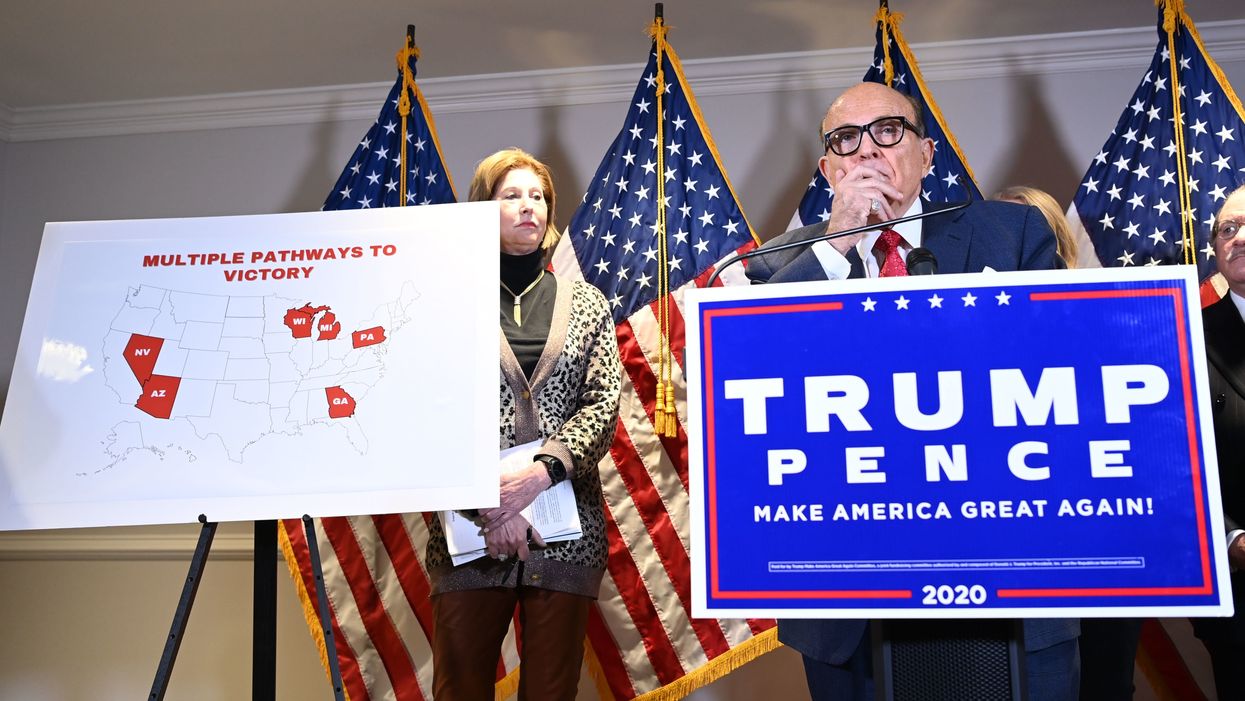Donald Trump's new double bankshot plan for clinging to the presidency, while demolishing the electoral process and devastating the nation's confidence in democracy, is beginning with a fresh campaign to delay rather than discredit results in a handful of battlegrounds he lost.
It gained a hint of dangerous traction Wednesday night, when both Republican election board members in Detroit asked to reverse their willingness to finalize the count in Michigan's largest county. They said they acted after the president telephoned following their palpably reluctant decisions to vote yes, which ended a tense three-hour partisan standoff just before Tuesday night's deadline.
The board's two Democrats said Thursday it's too late to backtrack, setting up yet another Trump campaign lawsuit hoping to stall the next step in the process: Monday's scheduled certification of results statewide, showing President-elect Joe Biden securing Michigan's 16 electoral votes by a margin above 157,000 votes.
There has been no credible evidence of election fraud in Michigan, or any of the four other states that Biden flipped to capture the presidency — and where the Trump campaign is following up an initial barrage of lawsuits baselessly alleging fraud with a new fusillade of allegations aiming to slow things down.
The tactic's goal, at a minimum, is to sow so much doubt about the legitimacy of Biden's election that Trump remains politically potent after leaving the White House.
The wildly more ambitious track taken by Trump's not-very-well-organized legal team aims to to set in motion a multifaceted and longshot path to his reelection — notwithstanding the will of a nation that preferred Biden by almost 6 million votes, a victory margin of 4 percentage points.
If states Biden won narrowly are forced to keep their final vote totals in limbo for three more weeks, the Trump strategists believe, then slates of Democratic electors can be prevented from casting ballots when the Electoral College convenes.
After that, the president's team would have two avenues to pursue: persuading Republicans in charge of legislatures in all fives states to name their own slates of reliably pro-Trump electors, or making sure that the morass is so deep that no electors of any kind get named in enough of the states to hold Biden's total below 270 votes.
When no candidate secures a majority in the Electoral College, the president is picked in January by members of the House, each state delegation getting one vote. The GOP will control a majority of delegations next year.
Twelve days after the counting of a record 150-million-plus votes made Biden's victory clear, another poll underscored the effect that a modern president in our polarized times can have when he wages an unprecedented disinformation campaign against democracy.
The survey by Monmouth University found only 60 percent of Americans believing Biden won fair and square — with 77 percent of Trump's supporters believing the Democrat only won because of fraud. The poll, over four days ending Monday, also found just 22 percent of Republicans saying they are confident in the electoral process, down from 55 percent when Monmouth asked the same question before Election Day.
The two GOP members of the elections board in Michigan's Wayne County, Monica Palmer and William Hartmann, signed affidavits Wednesday night saying they had acted under political pressure and threats to their families and still suspected the election returns were flawed. Both told reporters Thursday that Trump had not explicitly asked them to change their minds.
Biden carried the county by 2 to 1, propelling his 3-point win statewide.
Among the major battlegrounds, results have now been locked down in Michigan and Wisconsin but not in Pennsylvania, Georgia or Arizona.
The state GOP has sued to stop certification in Phoenix unless there's a partial recount first. The Trump campaign has already filed one suit to stop the vote certification in Michigan. It is paying $3 million for a recount in Wisconsin's two most populous counties, but not before a pitched partisan battle Wednesday at the state election board about the ground rules. And Trump's personal attorney Rudy Giuliani went to federal court Tuesday in hopes of stopping the certification in Pennsylvania.
The campaign's next likely move is to demand an even more comprehensive recount than the one that finished overnight in Georgia, which still showed him losing by about half a percentage point.
Recounts and court challenges must deliver final counts by Dec. 8, or else they are open to the sorts of challenges that could upend an orderly Electoral College meeting (actually 51 different meetings) on Dec. 14.
The shifted tactics come as the failure of the first phase of Trump's strategy becomes clearer. His campaign and other Republican interests have filed at least 30 election lawsuits in the swing states, according to an NBC News tally, and so far no court has found a single instance of notable fraud — which is why 18 of the complaints have already been denied, dismissed, settled or withdrawn.
"This is enough to overturn any election," Giuliani said Thursday afternoon at an off-kilter news conference, where he alleged widespread fraud by "Democratic bosses" and that the Trump campaign still has "multiple pathways to victory".




















